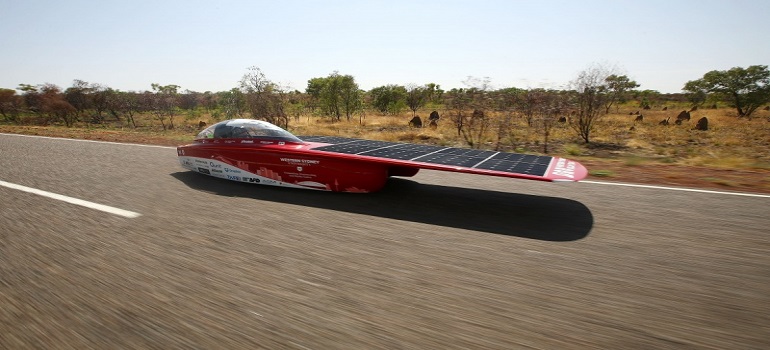
It seems when it comes to solar cars – no one can catch the flying Dutch. In the 30th anniversary year of the Bridgestone World Solar Challenge they have reigned supreme.
Having already won the Challenger Class title on Thursday, when Team Nuon crossed the line first one hour, 58 minutes and 37 seconds ahead of second place Michigan, another Dutch team, from Eindhoven, shone in the Cruiser Class. With an unassailable lead in energy efficiency going into the final stage of judging yesterday, their 2017 win was made official at the Awards Ceremony in Adelaide.
Also announced, was the practicality judging ranking scores which evaluated the market potential of each Cruiser vehicle. This stage of judging took a consumer focus assessing characteristics such as: ease of access; comfort; controls; features; style; overall desirability; parking and storage space.
An expert panel of adjudicators including Danish born Australian adventurer and founder of the World Solar Challenge, Hans Tholstrup, the first person to cross Australia in a solar powered car; Andris ‘Andy’ Samsons – Senior Ford Australia Engineer & World Solar Challenge Alumni, Mr Takashi Tomomoto – Senior Vice President & Chief Marketing Officer Bridgestone Corporation and Rani Snowdon representing the consumer perspective; put the cars through their paces on the finish line. Teams were tested for their parking skills, 3-point turn, and their ability to pack assorted items into the car.
A range of features and fit-outs caught the judges’ eye – from touch-screen connectivity, airconditioning, smart apps, vegan pineapple leather seats, to sound systems and everything in between. Special mention to US Prisum team for Australian market appeal – they included an ‘esky’ in the boot, with beer on ice. Some teams focused on interior comfort, while others had safety and road registration on their radar. In the battle of the ‘pitches’ Eindhoven and Bochum delivered detailed presentations with the creative edge going to Bochum who performed a comedic skit.
In the final practicality wrap-up, the Eindhoven car continued its dominance, with features including an app which recommends sunny parking spaces, an upholstered spacious interior, and the ability to install a rear-facing child’s seat in the rear. Second in the practicality ranks, Bochum highlighted the feel of the doors, the sustainability of the materials used, and their four-wheel-drive feature (a first for a solar car). Brisbane-based team Arrow highlighted their intent to commercialise the vehicle, building a car suited to future road registration.
With the final efficiency scores also now tallied – Eindhoven carried 3.4 people using only 46 kWh of energy – well ahead of Bochum who carried an average of 2.6 people (88 kWh) and third-placed Arrow who carried 1.7 people with the highest external energy of 91kWh. Combining the practicality and efficiency scores led to a clear first place to the team from Eindhoven, second to Bochum, and third to Arrow.
Dr David Snowdon, Bridgestone World Solar Challenge Faculty and Cruiser Class Manager, congratulated Team Eindhoven for winning all three – the efficiency, practicality and overall winner stages with their solar car Stella Vie.
‘I also congratulate them on their innovation, practical design and interior style with the every-day driver in mind. ‘Stella Vie’ is a wonderful solar car in a field of exceptional cars and teams.
I look forward to 2019 as we work toward road registration and commercialisation” Dr Snowdon said.
The awards were streamed live from the BWSC website with teams’ home countries tuning into the results. The Awards Ceremony also recognised Belgium’s Punch Powertrain for the CSIRO Technical Innovation Award for their ground-breaking inclusion of a Geneva Drive and electromechanical actuator which delivered all-wheel steering for tight corners and reduced drag in crosswinds. The Safety Award went to Canada’s Blue Sky Solar Racing for their overall preparation and safety plan and the ‘David Fewchuk Spirit of the Event’ Award went to the Netherland’s Nuon Solar Team, who from start to finish, exemplified professionalism, team spirit and technical excellence. The Western Sydney University team took out the Promotional Award for their efforts promoting the event.
Earlier in the day Adelaide turned on the sun to farewell all teams as their solar cars made a final parade through the city streets.

